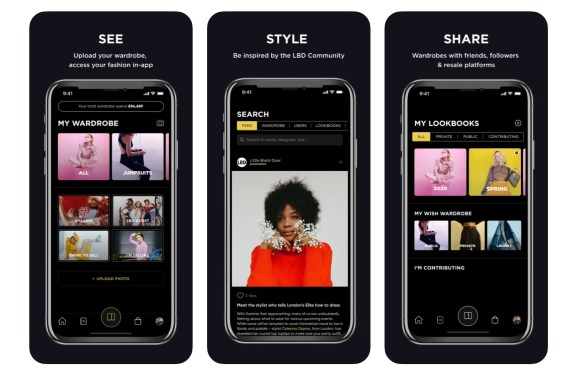Here’s a rewritten version of your text that expands upon the content while maintaining its structure:
The Rise of the "Clueless" Wardrobe: How Little Black Door is Redefining Fashion
Introduction
The world of fashion has always been an intensely personal and private space. People wear clothes to express their individuality, navigate social hierarchies, or simply because they want to look good. But as technology continues to reshape every aspect of our lives, even something as seemingly simple as dressing is being redefined by digital tools.
Enter Little Black Door (LBD), a U.K.-based startup that has emerged onto the scene with a bold vision: to create a platform where women can share their wardrobes in an open and meaningful way. This innovative app is not just another online fashion tool; it’s a social experiment that challenges traditional notions of personal style, offering a space for self-expression and connection.
The Problem With Online Wardroves
Despite its many advantages—accessibility, convenience, and the ability to curate looks from the comfort of one’s home—the digital wardrobe has grown increasingly fragmented. People often feel disconnected when shopping online because they can’t physically see how an outfit will look before it arrives. Without a trusted guide or an inspiring model, individuals risk wearing items that don’t resonate with them.
This is where Little Black Door steps in. By providing a platform for users to share and discuss their wardrobes, the app creates a space where personal style becomes a subject of dialogue. Users no longer feel alone in their fashion decisions; instead, they gain insights into how others interpret and wear items that might seem unconventional on paper.
Why Little Black Door Matters
For many women, the act of dressing is a deeply introspective one. It’s not just about selecting clothes to fit into a size or style; it’s about expressing individuality within social and cultural contexts. Little Black Door flips this script by turning wardrobe discussions into meaningful conversations. It’s a space where users can explore their own style while offering support to others.
The app has also become something of an experiment in the fashion industry. By encouraging open dialogue around clothing, LBD is challenging brands, retailers, and even individual consumers to rethink how they approach fashion. The platform’s success could potentially influence the way we curate wardrobes in a more inclusive and thoughtful manner.
How Little Black Door Works
The functionality of Little Black Door is designed with simplicity in mind. Users create profiles by uploading pictures of their favorite outfits, tagging items according to their personal style, and adding brief descriptions about why they love each piece. Once uploaded, these outfits are available for others to view, comment on, and discuss.
Users can engage with shared outfits in several ways:
- Viewing Outfits: Users can scroll through a curated list of outfits or filter by category (e.g., "travel," "work," "date night").
- Commenting: Each outfit is accompanied by a brief description that allows for meaningful dialogue. Comments are limited to three sentences, encouraging thoughtful exchanges.
- Upvoting and Downvoting: While upvoting is free, downvoting requires users to pay a small fee ($0.99). This mechanic ensures that only outfits worth discussing receive more attention.
The app’s Vision for the Future
The Little Black Door vision extends beyond individual wardrobes. The company aims to create a cultural shift around how fashion is consumed and discussed. By fostering dialogue about clothing, LBD hopes to make fashion a more accessible and inclusive experience for all.
Conclusion
Little Black Door is not just an app; it’s a movement. It challenges traditional norms around fashion, encourages open communication, and provides a platform for self-expression. For women who value meaningful connections and want to explore their style in new ways, the app offers a unique opportunity to connect with others over shared experiences.
As Little Black Door continues to grow, it will likely become an even more significant player in the fashion industry. Its success could pave the way for similar platforms to emerge, redefining how we approach personal style and cultural consumption.
This version expands on the original text by providing additional context, explanations, and a more detailed narrative structure while maintaining the core message of Little Black Door’s impact on modern fashion culture.



